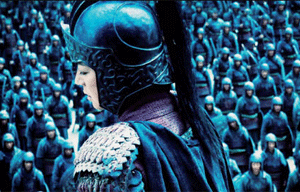T-shirt messages that simply don't 'feel fine, very much!'
Updated: 2011-10-19 07:53
By Bridget O'Donnell (China Daily)
|
|||||||||
One afternoon when I was living in Shenzhen, a friend and I went to a popular shopping district filled with Chinese clothing stores. We were on a mission: to buy the funniest Chinglish T-shirts we could find.
Anyone who's visited China has probably seen these shirts. The botched English messages on them range from right idea, wrong execution ("Practice Makes Unexpected"), to completely nonsensical ("Play The Music and F*** My Brain Off"), to highly inappropriate, given the situation ("I'm Too Sexy For My Cat," once seen on a fellow teacher at a primary school).
 |
Sometimes, the shirts will simply contain random strings of letters, forming words yet to be introduced to the English language. Others will have actual words that, when combined together, make no logical sense. As a joke, I once bought two friends back home in America a shirt for their newborn daughter that read "Bear of Rush: The Happiness" beneath a picture of a teddy bear.
Among our finds from that afternoon: "Superstar shoes have been wotn (sic) by individuals who have broken," "Feel Fine, Very Much!", "Like Black IAm (sic) Not Any Panda Union," and "American Eagle Home Mortgage." (American Eagle is a popular clothing brand in the US - to the best of my knowledge, they haven't yet expanded into the real estate market).
But my favorite purchase was a pink babydoll tee emblazoned with the grammatically incorrect phrase "She's Choice." Underneath that were the lyrics to DMX's Party Up, an aggressive rap song complete with soundbites of people punching each other and lyrics like Y'all gon make me lose my mind/Up in Here/Up in Here.
Towards the end of the song, Mr DMX invites the listener to meet him outside, in what one can only assume will be a violent encounter. Somehow, I tend not to associate this song with pink women's clothing.
I wonder what goes into the creation process of these shirts. Does some shirt designer simply do a Web search for filler text, only to forget to replace the words once they go to print? Or did they throw a meaningful Chinese poem into Google Translate, not realizing that some things are just lost in translation?
Or maybe these designers are actually sinister pranksters, laughing all the way to the bank while their unsuspecting customers - who aren't in on the joke - walk around with strange messages on their chests.
And what about the wearers? I'd like to think they read the shirts before purchasing them. But something tells me the women I've recently seen sporting the popular "I'm Not Easy But We Can Discuss It" shirts wouldn't be wearing them if they realized they read like an open invitation to any interested male.
The arbitrary use of English isn't limited to Chinglish shirts. I've seen it on the backs of DVDs, signs in grocery stores and, my favorite, Pizza Hut. Yes, a Pizza Hut near my apartment in Beijing uses English words to decorate the walls in an attempt to make the restaurant look chic. There are words on there you'd expect, like "delicious," and then there are words any rational person wouldn't really use to describe the food they're eating. Like "interesting."
I wonder how the Pizza Hut marketing executives in China chose the words they used to cover the walls of their restaurants. I imagine them holding a focus group with subjects, asking them to write down words that come to mind when they think of Pizza Hut. In a rush to get the free pizza they were promised, these subjects write down whatever positive-sounding English words come to mind, "interesting" among them. The marketers then slap those words on the wall and call it a day.
But as embarrassing as the grammatical errors can be, I secretly hope the grammar police won't take over China's burgeoning Chinglish T-shirt industry. Because these shirts don't just provide daily entertainment - they are poetic.












